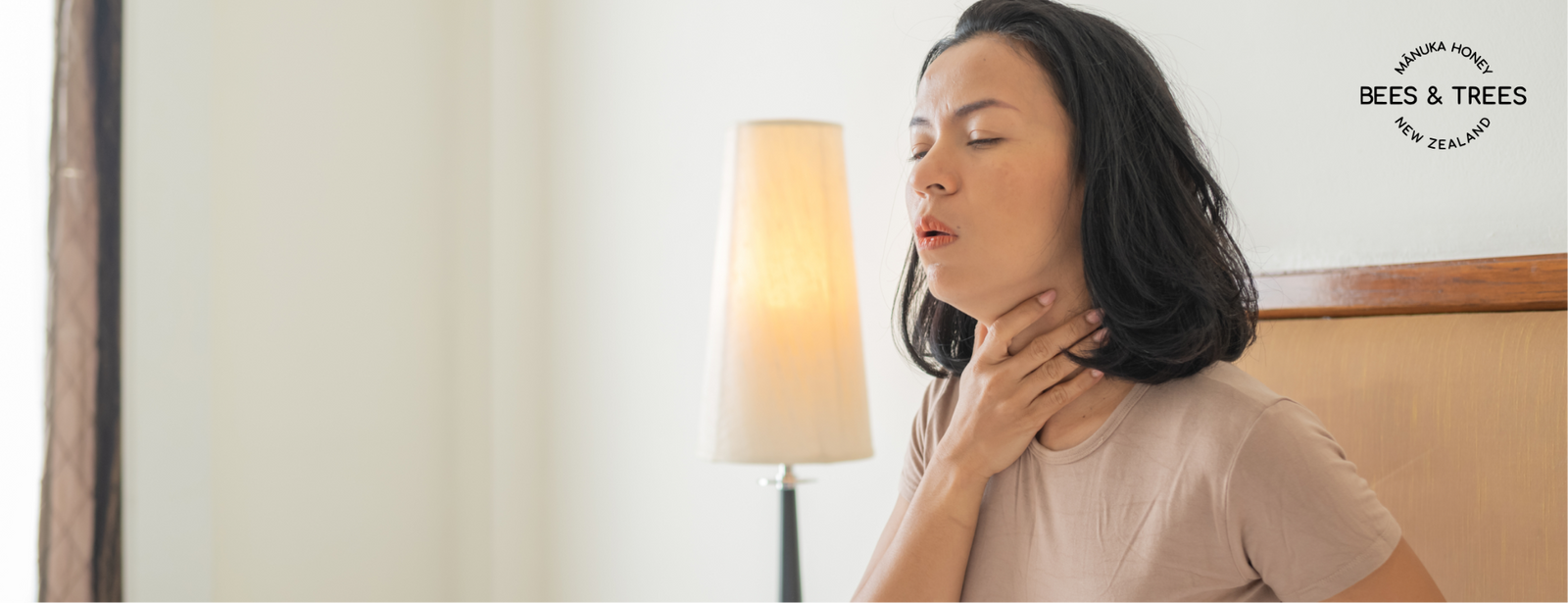A stubborn cough or lingering cold can throw your whole routine off balance. Nights are interrupted by fits of coughing, your throat feels raw, and even simple tasks seem harder when you’re tired and run down. In these moments, most of us are looking for something simple, safe, and soothing to bring a bit of relief.
That is why healthcare professionals often suggest starting with gentle self-care before moving on to stronger medicines or antibiotics. Honey has been a trusted option for generations, and among the many varieties, Manuka honey stands out for its unique natural makeup and robust quality standards.
In the UK, the National Institute for Health and Care Excellence (NICE) advises honey as a first-line self-care measure for uncomplicated acute cough in adults and children over 12 months (NICE guidance). Similarly, the NHS includes warm lemon-and-honey drinks in its self-care recommendations for easing sore throats and calming coughs (NHS: Common cold).
While most scientific research on cough and cold symptoms has looked at honey in general, the results are encouraging and provide a helpful guide for how Manuka honey may be used as part of self-care:
-
Reduced cough frequency and severity (BMJ Evidence-Based Medicine review)
-
Improved overall upper respiratory tract infection (URTI) symptom scores (PubMed systematic review)
-
Better sleep quality, especially when taken at bedtime (Pediatrics RCT)
Manuka honey shares these qualities and is also rich in distinctive natural compounds, such as methylglyoxal (MGO), which have been studied for their potential antiviral, antibacterial, and anti-inflammatory properties in laboratory settings.
In this guide, we’ll explore;
-
What current research says about Manuka honey’s role in soothing coughs and colds, how to take it,
-
How to choose the right strength, and
-
When to seek medical advice, so you can make informed, confident choices about using it as part of your self-care routine.
Manuka Honey Properties That May Support Respiratory Health
Manuka honey isn’t just distinguished by its rich taste; it contains unique natural compounds that have been studied for their potential role in supporting respiratory health. These qualities work together to create a profile that is both soothing and scientifically interesting, offering possible benefits for those managing coughs, colds, and related symptoms.
Antiviral Activity
In cell culture studies, Manuka honey has shown signs of slowing influenza virus replication and, in lab models, has enhanced the activity of antiviral medicines such as oseltamivir and zanamivir (Watanabe et al., 2014).
Its key compound, methylglyoxal (MGO), has also inhibited influenza B replication in vitro, including in strains with resistance to common antivirals (Takeda et al., 2016).
Antibacterial Effects and Antibiotic Synergy
Manuka honey is known for notable antibacterial activity that is not due to hydrogen peroxide; in laboratory studies, this has been linked largely to methylglyoxal (MGO) (Mavric et al., 2008).
In preclinical research using animal lung-tissue models that simulate cystic fibrosis infections, Manuka honey lowered counts of certain antibiotic-resistant bacteria, and in some experiments, the combination of Manuka honey and antibiotics outperformed either alone.
This potential synergy is an area of active interest in antimicrobial research.
Emerging Research on Respiratory Pathogens
Early in vitro studies have explored how Manuka honey interacts with Mycobacterium abscessus, a challenging respiratory pathogen seen in people with cystic fibrosis.
These lab experiments suggest Manuka honey may inhibit the bacteria and could enhance the activity of certain antibiotics in experimental nebulized formulations (Milton et al., 2022).
Anti-Inflammatory and Antioxidant Properties
Beyond its germ-fighting potential, lab models suggest Manuka honey may help calm inflammation and reduce oxidative stress. In immune-cell studies (such as RAW 264.7 macrophages), it dampened the TLR4/NF-κB pathway and lowered pro-inflammatory signals like TNF-α, IL-1β, and IL-6 (MDPI, 2023). These are laboratory findings; well-designed human studies are still needed to confirm how this translates in everyday use.
These mechanisms could help ease throat irritation and support overall comfort during respiratory illness.
Manuka Honey for Relief of Cough and Cold Symptoms: What the Research Says

Thanks to its distinctive natural makeup, Manuka honey fits within the wider research on honey and respiratory symptoms. While most clinical studies have examined honey in general rather than Manuka specifically, they provide a helpful guide to how Manuka may play a supportive role in cough and cold self-care.
Medical Guideline recommendations:
-
NICE includes honey as a first-line self-care option for uncomplicated acute cough in adults and children over 12 months (NICE guidance).
-
The NHS suggests warm lemon-and-honey drinks to soothe sore throats and ease cough discomfort (NHS: Common cold).
Human clinical evidence on honey (general):
-
Systematic review & meta-analysis (Abuelgasim et al., 2021): Honey was found to improve cough frequency and severity and reduce overall URTI symptoms compared with usual care (BMJ Evidence-Based Medicine).
-
Randomised controlled trials:
-
Paul et al., 2007: In children with nocturnal cough, honey improved cough scores and sleep quality more than dextromethorphan or no treatment.
-
Cohen et al., 2012: A single bedtime dose improved night-time cough and sleep in children over 12 months.
-
Cochrane Review (Oduwole et al., 2018): Honey may be more effective than a placebo or no treatment for cough in children (Cochrane Library).
Manuka-specific laboratory evidence:
-
Studies on methylglyoxal (MGO), a defining compound in Manuka honey, indicate that it may inhibit influenza virus replication in vitro (Watanabe et al., 2014).
These antiviral findings are limited to lab models; no clinical trials have yet confirmed Manuka honey’s direct effect on cold or flu viruses in humans.
How and When to Take Manuka Honey for Coughs and Colds

If you decide to try Manuka honey as part of your cough or cold self-care routine, a few simple steps can help you get the most from its soothing qualities. These suggestions align with traditional use and NHS self-care recommendations for honey, while recognizing that most clinical evidence is based on honey in general.
1. Keep it Warm, Not Boiling
Heat can damage some of honey’s natural compounds. For drinks, use warm, not hot, water or tea (NHS: Cough self-care).
2. Slow Melt for Sore Throat Relief
Hold the Manuka honey in your mouth and let it melt slowly, allowing it to spread evenly and form a smooth, soothing layer over your throat. This gentle coating can help ease irritation, providing long-lasting comfort and natural support for cough and sore throat symptoms.
3. Use Small, Regular Servings
Short, frequent doses can be more effective for comfort than one large serving.
Common methods:
-
From the spoon: 1–2 teaspoons taken slowly
-
In a warm drink: Stir into warm water or caffeine-free tea; lemon or ginger may be added for taste and extra comfort
-
Before bed: Take 15–30 minutes before sleep to help settle nighttime coughs
Typical Amounts
-
Adults: 1/2–1 teaspoon up to several times daily
-
Children over 12 months: ½–1 teaspoons, typically at bedtime (Pediatrics RCT)
(Avoid honey for infants under 12 months — CDC)
Choosing the Right Strength of Manuka Honey for Cough and Cold Relief: MGO and UMF® Ratings Explained
When it comes to Manuka honey for coughs and colds, quality matters just as much as how you take it. MGO (methylglyoxal) is found in uniquely higher concentrations in natural Manuka honey. Manuka honey’s strength and purity are determined by its MGO content.
-
MGO is a naturally occurring compound found in high concentrations in Manuka Honey and is responsible for Manuka Honey’s antibacterial, anti-inflammatory, and antioxidant activity in lab studies (Mavric et al. 2008). A higher MGO number indicates greater concentration, but it doesn’t mean you need the highest possible rating for everyday use.
-
The UMF® rating system is a lookup value that directly correlates to the MGO concentration. For example, UMF 12+ ≈ 354 mg/kg, UMF 16 ≈ ~570 mg/kg, and UMF 20+ ≈ 829 mg/kg.
-
MGO ratings express how many milligrams of methylglyoxal are present per kilogram of honey (mg/kg). This is displayed as an MGO rating on the label, expressed in milligrams per kilogram (mg/kg). For example, MGO 350+ means at least 350 mg of MGO per kg, MGO 550+ means ≥550 mg/kg, and MGO 830+ means ≥830 mg/kg. The higher the number, the higher the MGO and the more potent the honey.
-
Independent batch laboratory testing: The MGO concentration is based on laboratory testing. These tests provide traceable third-party verification that the honey matches its label claims and meets recognized standards (for New Zealand Manuka, the MPI definition). Reputable brands will publish a batch-specific Certificate of Analysis (COA) from an independent IANZ-accredited laboratory.
The COA shows test results for the following against set standards, as measured at the time of bottling;
-
Potency (MGO and DHA),
-
Purity (adulteration screens such as C4 sugar and isotope profiling),
-
Product condition (freshness markers like HMF and moisture),
You can learn more in our Ultimate Manuka Honey Buying Guide.
Which MGO rating is right for you?
-
As a starting point, choose a jar labeled MGO 250+ (≥250 mg/kg) or higher to access Manuka honey’s distinctive properties; most scientific studies have tested Manuka honey containing a minimum of ≥250 mg/kg MGO.
-
Midrange MGO-rated Manuka honey, with an MGO 350+, works well for everyday wellness in your tea or with food.
-
For stronger support for soothing coughs or colds, many people choose a higher-rated option like MGO 550+ as a balance between potency and value.
-
For those who want the richest taste and highest verified strength, higher MGO grades like MGO 830+ are available. This is usually taken for short periods of time and is typically not suitable for daily use, primarily due to its premium price.
You can compare our range in the Bees & Trees Manuka Honey Collection.
What to check before purchasing
-
MGO concentration is clearly printed on the label
-
Independently verified, batch-specific lab results (from an accredited laboratory) are publicly available
-
Proof of New Zealand origin with authentic traceability (e.g., NZ govt-backed Fermark Logo with verified license number)
You can learn more in our Ultimate Manuka Honey Buying Guide.
Our Bees & Trees Quality Promise ensures every jar is Authenticity-certified, batch-tested, backed by a 100% Satisfaction Guarantee, and packed in New Zealand, so you can trust you're getting genuine Manuka honey with verified potency.
Manuka Honey Safety Guidelines and When to Seek Medical Advice

Once you’ve chosen the right MGO strength, it’s just as important to know how to use Manuka honey safely and when to consult a healthcare professional. These precautions apply whether you’re taking Manuka honey for cough relief, sore throat soothing, or general wellness.
Who Should Avoid Manuka Honey
-
Infants under 12 months — honey of any kind should not be given to babies because of the risk of infant botulism (CDC guidance).
-
People with bee-product allergies — avoid Manuka honey if you have known allergic reactions to honey, beeswax, or other bee-derived products.
-
Those with diabetes or on carbohydrate-restricted diets — honey is a natural sugar source; if you have a medical condition requiring blood sugar management, speak to your doctor before adding it to your diet.
When to Seek Medical Advice
While Manuka honey can be a comforting part of self-care, some symptoms signal the need for professional evaluation:
-
High or persistent fever
-
Shortness of breath
-
Chest pain or tightness
-
Confusion, dizziness, or dehydration
-
Cough or cold symptoms lasting more than three weeks
-
Worsening or unusually severe symptoms
If you’re unsure whether your symptoms require medical attention, it’s always best to check with a healthcare provider. Remember, Manuka honey is not a replacement for prescribed treatments; it’s most effective when used as part of a balanced care plan.
For more guidance on recognising when to seek help, see NHS advice on When a Cough Means It’s Time to See a Doctor.
The Future of Manuka Honey: Soothing Relief Now, Scientific Breakthroughs to Come
Manuka honey can be a soothing, natural addition to your self-care routine during coughs and colds. Evidence from honey research shows it can ease cough frequency and severity, support better sleep, and make symptoms more manageable. Laboratory studies on Manuka honey’s distinctive compound — methylglyoxal (MGO) — highlight its potential antiviral, antibacterial, and anti-inflammatory activity, adding to its appeal as part of a supportive wellness plan.
While these findings are promising, most Manuka-specific research comes from laboratory and preclinical studies. Well-designed human clinical trials are still needed to confirm exactly how these benefits translate in everyday use. That said, ongoing studies continue to expand our understanding, making Manuka honey an exciting area of natural health research.
When choosing Manuka honey, authenticity and transparency matter most. Look for products that are harvested in New Zealand, batch-tested in independent laboratories, and clearly labelled with verified MGO levels. These steps ensure you know exactly what you’re getting — a genuine product with measured potency and traceable origins.
At Bees & Trees, we’re committed to producing authentic New Zealand Manuka honey with every batch independently tested for purity, MGO content, and safety. This means you can be confident in the quality of what’s in your jar.
Discover our Manuka Honey Collection to find the MGO level that suits your needs, and keep a jar on hand this season for trusted, natural comfort.





